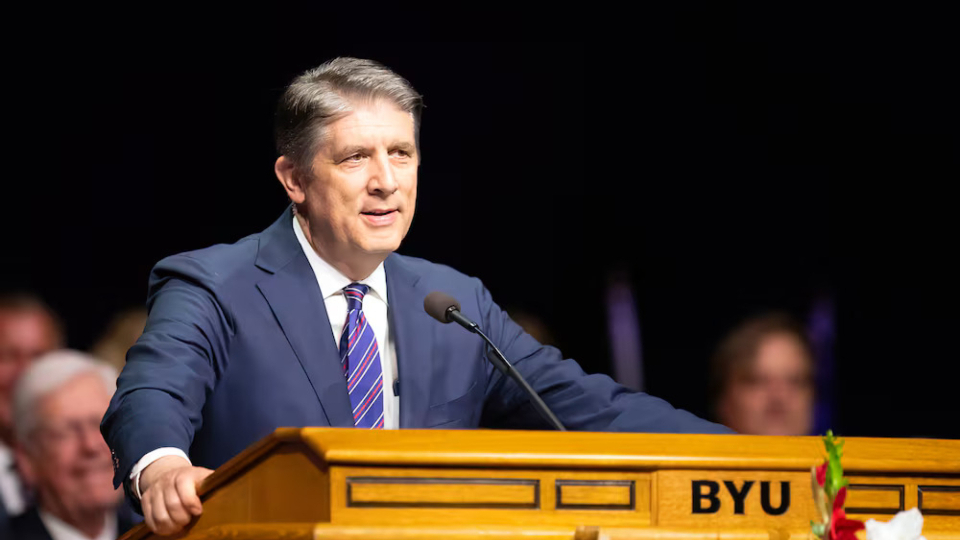| Elder Matthew S. Holland, General Authority Seventy, speaks during the 2024 Patriotic Service of America’s Freedom Festival at Provo, held in the Marriott Center on the Brigham Young University campus in Provo, Utah, on Sunday, June 30, 2024. Photo by Adam Fondren, courtesy of Church News. Copyright 2024 Deseret News Publishing Company. | 1 / 13 |
This story appears here courtesy of TheChurchNews.com. It is not for use by other media.
By Joel Randall, Church News
Before 1776, civilizations throughout nearly all human history were governed in one of three ways: brute force, aristocratic tradition or the assertion of divine right. Many leaders had consequently supposed they were superior over those they governed.
Yet founding fathers in what would become the United States of America saw a country’s citizens differently: Everyone was “endowed by their Creator” with “unalienable rights” to “life, liberty and the pursuit of happiness.”
“By virtue of these rights, only government grounded in the consent of the governed was just,” said Elder Matthew S. Holland, a General Authority Seventy, on Sunday, June 30.
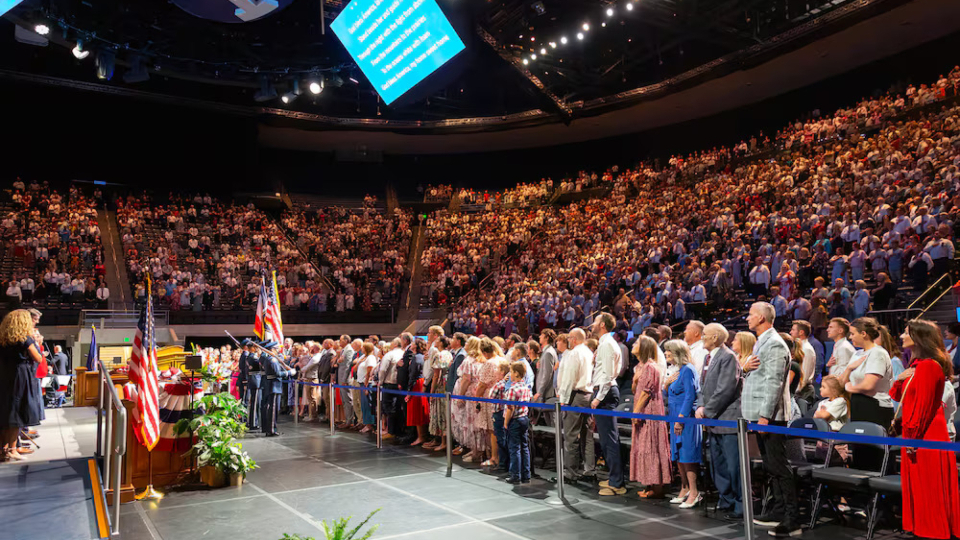
elder-holland-freedom-festival-2.jpg
With hands over hearts, spectators sing during the 2024 Patriotic Service of America’s Freedom Festival at Provo, held in the Marriott Center on the Brigham Young University campus in Provo, Utah, on Sunday, June 30, 2024. Photo by Adam Fondren, courtesy of Church News.Copyright 2024 Deseret News Publishing Company.Fifty-six people signed what was called the Declaration of Independence, a document to outline the rights endowed to citizens by their Heavenly Father. “The work of establishing God-given rights, they believed, would bring forth the protecting powers of God Himself.”
He continued, “What America stands for at its very best is far too rare to be trifled with in a fallen world. With this country, there is entrusted to each generation a sacred charge: to cherish the hallowed inheritance of our liberties and steward those liberties for all generations to come.”
Elder Holland was the keynote speaker at the 2024 Patriotic Service of America’s Freedom Festival in Provo, Utah. His wife, Sister Paige Holland; and his father, President Jeffrey R. Holland, acting president of the Quorum of the Twelve Apostles, were also in attendance.
In his remarks, given four days before the United States’ Independence Day, Elder Holland discussed three necessities required to “forge a future of freedom”: charity, hope and faith.
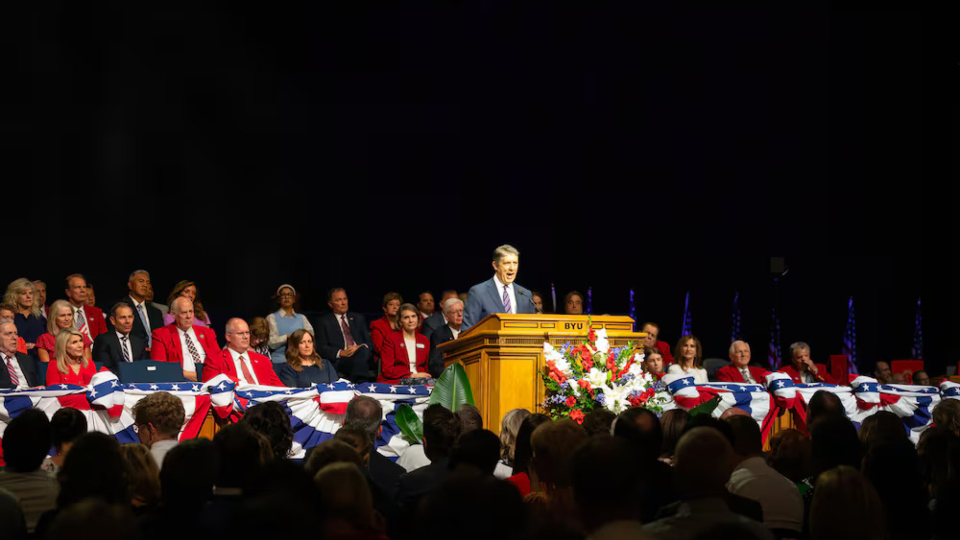
elder-holland-freedom-festival-3.jpg
Elder Matthew S. Holland, General Authority Seventy, speaks during the 2024 Patriotic Service of America’s Freedom Festival at Provo, held in the Marriott Center on the Brigham Young University campus in Provo, Utah, on Sunday, June 30, 2024. Photo by Adam Fondren, courtesy of Church News.Copyright 2024 Deseret News Publishing Company.Charity
In the year 1800, a U.S. election between John Adams and Thomas Jefferson — who held radically separate views on country-dividing issues — caused the pair’s deep friendship to rupture. They stopped speaking to each other.
Jefferson became president, but he realized the need to mend the relationship with his enemy. In his inaugural address, Jefferson said: “Let us then, fellow citizens, unite with one heart and one mind. Let us restore to social intercourse that harmony and affection without which liberty and even life are but dreary things.”
In time, unifying the country included the restoration of the rivals’ friendship.
“Where did Jefferson look for a resource to restore some degree of harmony and affection so needful among the battling parties of his day?” asked Elder Holland, continuing, “His answer is civic charity: broadly shared ideas of Christian love, artfully refashioned into a guiding public principle for all.”
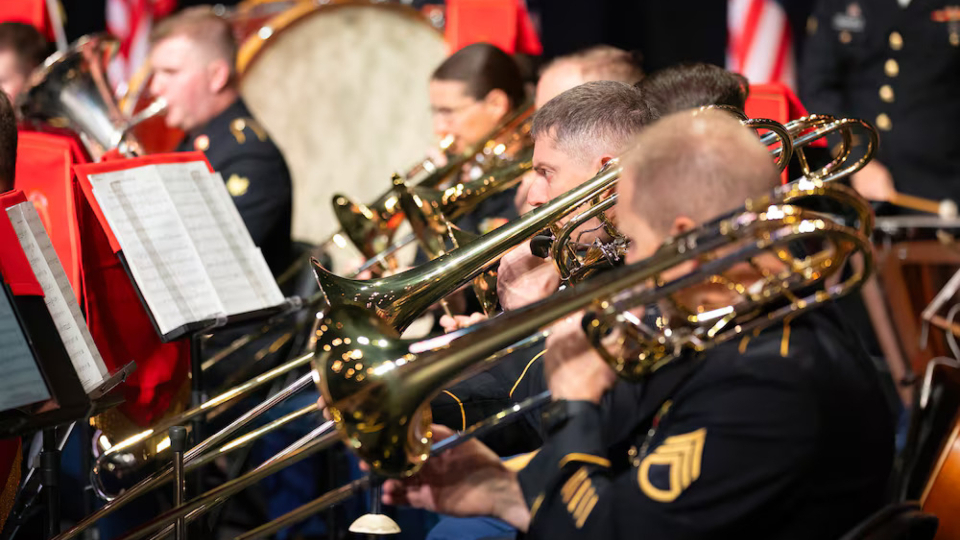
elder-holland-freedom-festival-4.jpg
The 23rd Army Band of the Utah National Guard brass sections plays during the 2024 Patriotic Service of America’s Freedom Festival at Provo, held in the Marriott Center on the Brigham Young University campus in Provo, Utah, on Sunday, June 30, 2024. Photo by Adam Fondren, courtesy of Church News.Copyright 2024 Deseret News Publishing Company.In 1 Corinthians 16:14, the apostle Paul wrote, “Let all your things be done with charity.” Charity — the “highest and holiest form of love of God and man,” Elder Holland said — should therefore establish even political life as citizens seek to love God by loving their enemies.
Despite disagreements while debating complex and tense issues of a country, “we remain peaceful and temperate and filled with love for others, including those others who oppose our views.”
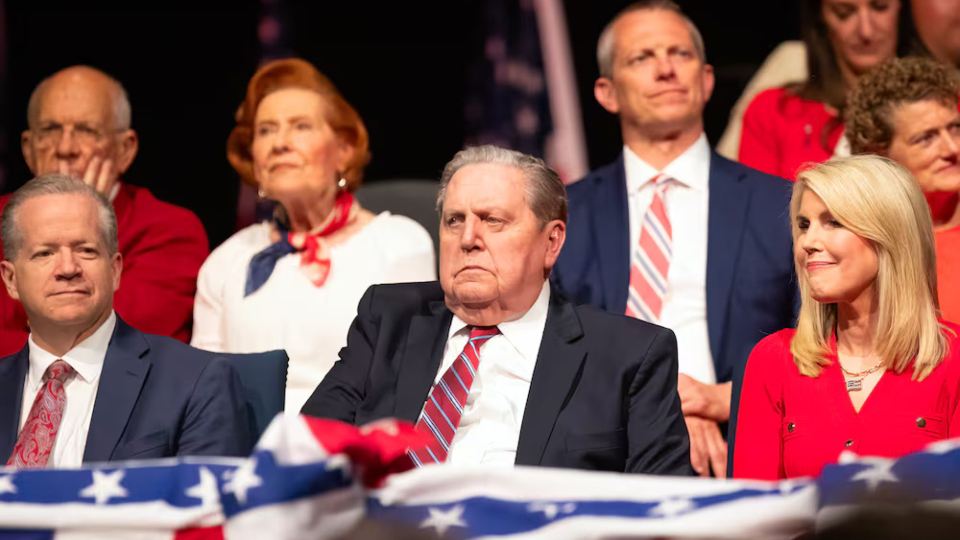
elder-holland-freedom-festival-5.jpg
President Jeffrey R. Holland, acting president of the Quorum of the Twelve Apostles, listens during his son's remarks at the 2024 Patriotic Service of America’s Freedom Festival at Provo, held in the Marriott Center on the Brigham Young University campus in Provo, Utah, on Sunday, June 30, 2024. Photo by Adam Fondren, courtesy of Church News.Copyright 2024 Deseret News Publishing Company.Hope
Explaining the trials of early saints, the apostle Paul wrote in 2 Corinthians 4:8-9: “We are troubled on every side, yet not distressed; we are perplexed, but not in despair; Persecuted, but not forsaken; cast down, but not destroyed.”
Elder Holland said, “Almost every era has weathered its own threatening divide. Yet again and again, we have emerged resilient and unified enough. Even in the face of uncertainty, we have reason today to take hope from the indomitable spirit that has guided this country in all previous generations.”
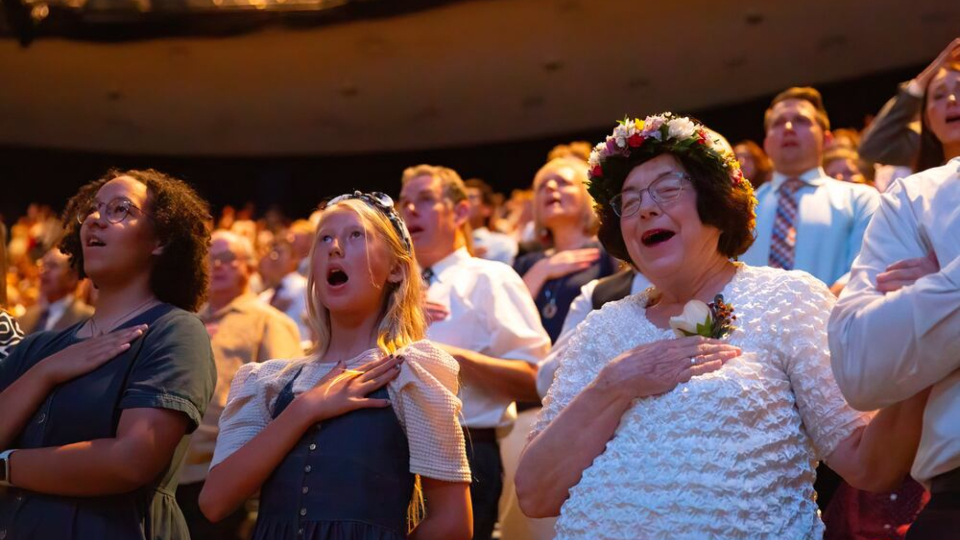
elder-holland-freedom-festival-6.JPG
With hands over hearts, spectators sing during the 2024 Patriotic Service of America’s Freedom Festival at Provo, held in the Marriott Center on the Brigham Young University campus in Provo, Utah, on Sunday, June 30, 2024. Photo by Adam Fondren, courtesy of Church News.Copyright 2024 Deseret News Publishing Company.The greatest source of a country’s hope for the future is not past or present success, he said. Instead, “our greatest source of hope is God Himself. Hope is both a heavenly gift to, and a human duty of, those who believe in Him.”
Through hope in Heavenly Father’s plan, even calamities can strengthen a country. In tense times, “it is not unreasonable to hope that the current events may awaken the nation to a healthier political, economic and social set of practices.”
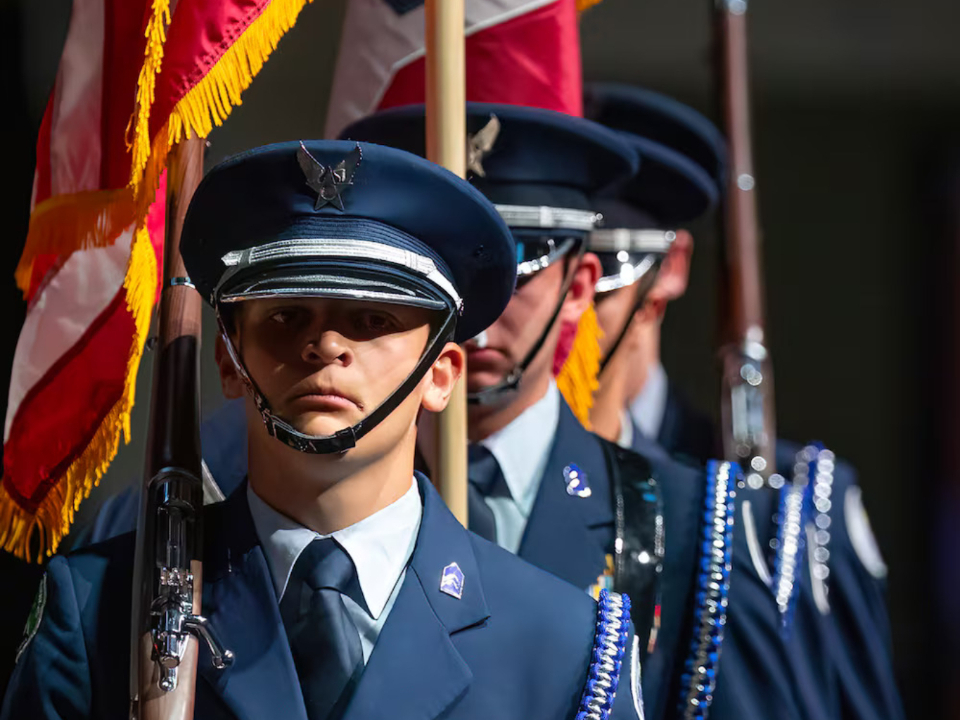
elder-holland-freedom-festival-7.jpg
The color guard enters during the 2024 Patriotic Service of America’s Freedom Festival at Provo, held in the Marriott Center on the Brigham Young University campus in Provo, Utah, on Sunday, June 30, 2024. Photo by Adam Fondren, courtesy of Church News.Copyright 2024 Deseret News Publishing Company.Faith
As a General Authority Seventy, Elder Holland has traveled throughout the United States to meet with many good citizens of various faiths.
“Rarely do I discover their politics,” he reflected, “but invariably I see and experience their basic decency, honesty and industry, and I come away thinking there is yet a great wellspring of virtue in this country in which we can trust.”
Elder Holland shared his conviction that although none are perfect, God has the ultimate strength to save a country, so Saints’ faith should be grounded in Him to preserve sacred liberties.
“Let us be settled, fixed and determined to forge a future freedom worthy of [the United States’] founding promise,” he concluded, “meeting each day and each difficulty with mighty faith, brightness of hope and charity for all.”
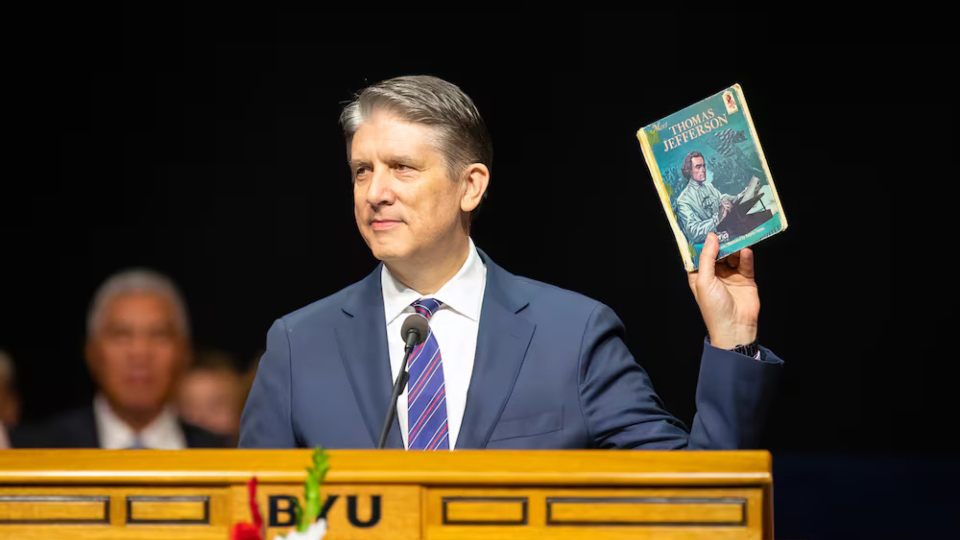
elder-holland-freedom-festival-8.jpg
Elder Matthew S. Holland, General Authority Seventy, holds up a book about Thomas Jefferson — the principal writer of the Declaration of Independence — that his father bought him as a child, during the 2024 Patriotic Service of America’s Freedom Festival at Provo, held in the Marriott Center on the Brigham Young University campus in Provo, Utah, on Sunday, June 30, 2024. Photo by Adam Fondren, courtesy of Church News.Copyright 2024 Deseret News Publishing Company.Copyright 2024 Deseret News Publishing Company.
